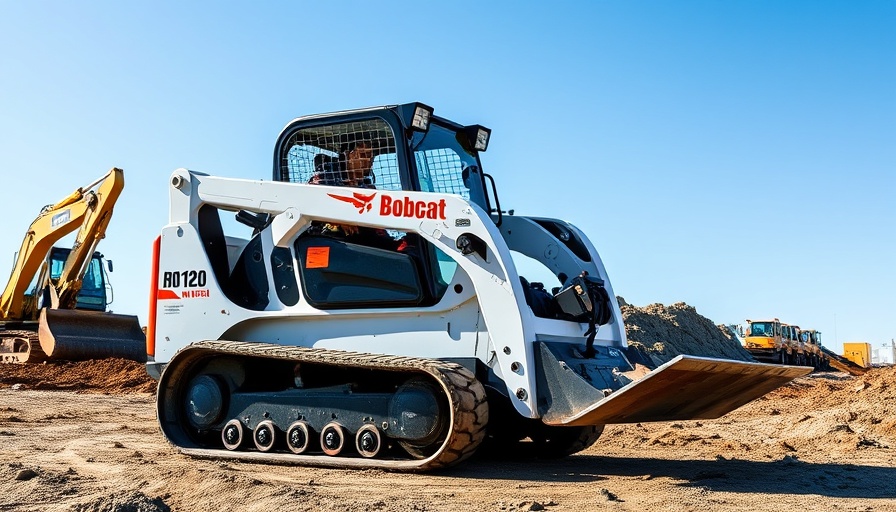
The Revolutionary Bobcat MT120: A Game Changer in Compact Equipment
Bobcat Company has unveiled its latest advancement in the world of compact equipment—the powerful new MT120 mini track loader. This machine, which boasts a rated operating capacity of 1,200 pounds, is designed to do more in less space, catering to operators who need efficiency and performance on tight job sites.
Power Meets Precision
Powered by a 24.5-horsepower high-torque diesel engine, the MT120 is not just another mini loader; it represents a step forward in terms of functionality and ease of use. Weighing in at 3,720 pounds, this loader features a top travel speed of 4.7 mph along with ultra-smooth pilot controls that enhance the operator's experience and improve cycle times dramatically. The introduction of a new direct-drive system is noteworthy. By eliminating belts, Bobcat reduces maintenance requirements significantly, allowing operators to focus more on their tasks and less on upkeep.
Versatile Features Designed for Efficacy
The MT120 offers unique features that set it apart from its competitors. It has two track options: standard 9-inch tracks with a width just under 36 inches, making it capable of fitting through narrow doorways and gates, and optional 11-inch-wide tracks tht increase its capability for heavier lifting with a manageable increase in overall width. The low ground pressure of 4.3 psi for the standard tracks and 3.9 psi for the wider option ensures minimal disturbance to the ground, which is especially beneficial on sensitive terrains.
Outstanding Lift Height and Comfort Features
One of the standout features of the Bobcat MT120 is its vertical lift design, providing a “best-in-class” lift height of 88 inches with a reach of 22 inches. This extension capability means operators can tackle challenging jobs more effectively. Moreover, Bobcat has integrated a ride-on platform designed for maximum operator comfort and productivity. It offers a clear line of sight to the bucket’s cutting edge and includes features such as cushioned hip pads and a design that redirects engine heat away from the operator.
Enhanced Control for Rigid Tasks
According to Katie Redenius, senior product manager at Bobcat Company, the MT120's design includes an auxiliary hydraulic function located on the workgroup handle, enabling operators to keep their hand on the joystick while managing hydraulic attachments. This innovative approach minimizes fatigue and increases operational efficiency by allowing tasks to be completed without cumbersome maneuvers.
Low Maintenance and Operational Costs
In today’s competitive marketplace, equipment care is vital for maximizing return on investment. The MT120 has been crafted from durable materials, significantly reducing daily service needs and ultimately lowering the total cost of ownership. It’s equipped with features like permanently lubricated rollers and a design that requires no tools for routine maintenance access.
Conclusion: Empowering Operators for Success
The Bobcat MT120 mini track loader incorporates cutting-edge technology and user-centric designs that enhance both performance and the operator’s experience, making it a vital addition for general contractors and DIY enthusiasts alike. With its advanced features, commitment to safety, and ease of maintenance, the MT120 represents a significant advancement in the compact loader market.
 Add Row
Add Row  Add
Add 




Write A Comment